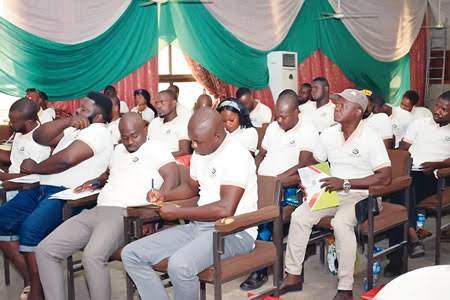Revemi Trade Limited, a Non-Governmental Organisation (NGO), through a grant from the United States Agency for International Development (USAID) has trained no fewer than 2,000 youths and women on cassava value chain in Delta.
Revemi Chief Executive Officer, Mr Oreva Amata, disclosed this at a capacity-building workshop, tagged, “Eki Farmers Support Programme” organised by the company for peasants farmers in Delta South Senatorial District on Friday in Ozoro.
Amata noted that the programme was sponsored by USAID in partnership with Delta Government and Townstalk.
According to him, Revemi, an Integrated Agrotech and Agro Commodities Trading Company has as target to train 10,000 based pyramid farmers and equip them with requisite information on how to plant, harvest, process and market their products to make money.
“We started the training in February this year, in Delta North, in June, we also trained those in Delta Central and today, we are training farmers from Delta South Senatorial District in Ozoro.
“So, far, we have trained over 2,000 low pyramid farmers but we are targeting 10,000 farmers in the state,” he said.
On the choice of cassava, Amata said that cassava remains a crop in which Nigeria has a comparative advantage in addition to the many by-product that cassava offers to the market.
He said that it has capacity to grow Nigeria’s Gross Domestic Products.
“Our mission is to bridge the critical gap in food security in Africa.
“As a first class graduate of economics, ever time I heard that farmers are poor in Africa, this is contradictory because foreign national are making billions of money from agriculture.
“Revemi as winner of the COVID-19 Food Security challenge in 2021, we won a grant from the USAID to carry out this training to liberate our poor farmers from hunger, increase their income by linking them up to the market.
“Agriculture is the backbone of development in any nation, it creates jobs for youths and women and also ensure security because the youths will be gainfully employed,” Amata said.
He said that his company would link all the trained farmers to sources of finance, provide them with information on climate change, weather conditions and availability of land across the state and from government sources.
On his part, Mr Anslem Emikpe, the Assistant Director, State Ministry of Agriculture and Natural Resource, advised the farmers to form clusters to enable them engage government, access funds and land.
Also, Dr Friday Okei, a Resource Person, said training on cassava value chain exposes the farmers to varieties of byproducts of cassava, such as starch, flour, garri, chips, raw material for production of alcohols and drugs and others.
In an interview, Mr Samuel Askia, Managing Director, Uzere Cassava Processing Factory, urged the farmers and governments to take positive initiative on what the NGO is doing, adding that the training gives hope for a brighter future for farmers in Nigeria.
“It is time for us to see agriculture as a commercial venture, so that we can benefit from the support the government at the centre is giving,” he said.
The beneficiaries, Mr Lawrence Ugwologho and Mrs Martha Odus lauded the programme and thanked the organisers for impacting them with the right knowledge on best practices on cassava value chain.
They said that the training had reawakened their minds on how to plant, harvest, process and market their cassava to make money for the family.
They, however, called for additional support in the areas of finance and land to expand cassava cultivation in the state.
